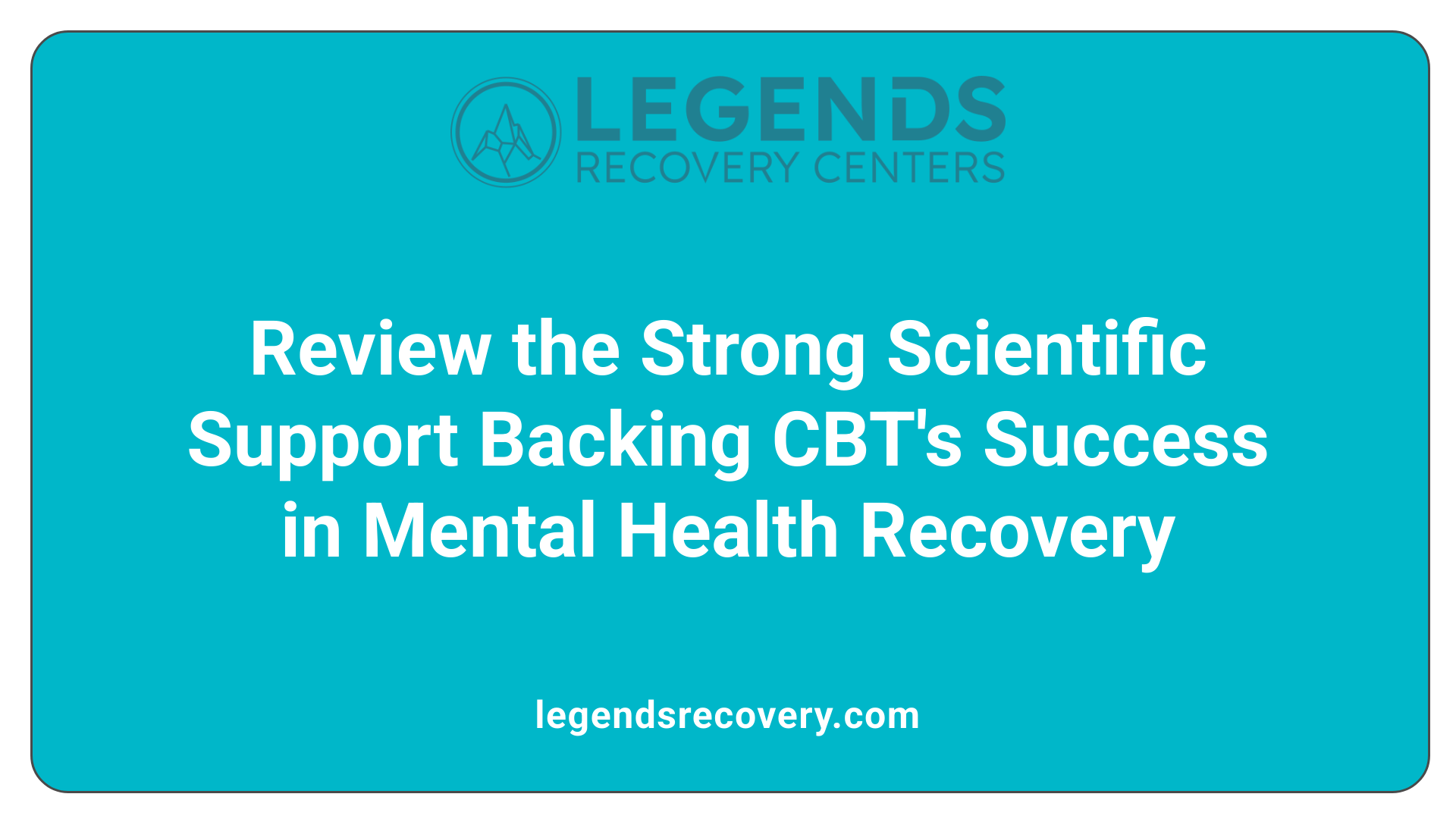How Cognitive Behavioral Therapy Empowers Recovery

Cognitive Behavioral Therapy (CBT) is a cornerstone of evidence-based mental health treatment that plays a pivotal role in recovery from various psychological and behavioral disorders. Its structured approach to modifying thought and behavior patterns has been extensively studied and validated across numerous populations and conditions. This article explores how CBT contributes significantly to mental health recovery by examining its mechanisms, techniques, scientific support, and its application in diverse treatment settings.
Cognitive Behavioral Therapy (CBT) is built on a set of core principles that focus on the close relationship between thoughts, feelings, and behaviors. Its primary approach involves identifying and challenging dysfunctional thinking patterns that trigger emotional distress or unhealthy behaviors. These patterns often include cognitive distortions—such as catastrophizing, Black-and-White thinking, or overgeneralization—that shape how individuals interpret their experiences.
At the heart of CBT are techniques like cognitive restructuring, which helps reframe negative automatic thoughts into more balanced, realistic perspectives. Exposure and behavioral experiments also play a role by allowing individuals to confront fears or triggers progressively, reducing avoidance behaviors that maintain psychological problems.
CBT targets underlying schemas—deeply held core beliefs about oneself, others, or the world—that influence automatic thoughts and reactions. By modifying these schemas, individuals often experience lasting change in their emotional responses and behaviors.
Furthermore, CBT emphasizes the development of practical skills, encouraging homework assignments and activities that promote self-awareness and self-help strategies. This structured approach helps individuals implement new coping mechanisms in daily life.
Mechanistically, CBT helps eliminate avoidant and safety-seeking behaviors that prevent correct assessment of reality. It promotes stress management by teaching relaxation strategies and mindfulness practices.
Through this systematic process, CBT fosters resilience, improves emotional regulation, and supports individuals in managing ongoing stressors. Its collaborative, goal-oriented framework ensures that clients are active participants in their recovery, making lasting changes within a manageable and structured therapy process.

Extensive research underscores that cognitive-behavioral therapy (CBT) is a highly effective treatment option for a wide array of mental health conditions. Multiple meta-analyses and systematic reviews have consistently demonstrated that CBT leads to significant reductions in symptoms for disorders such as anxiety, depression, obsessive-compulsive disorder (OCD), post-traumatic stress disorder (PTSD), and schizophrenia.
These studies reveal that CBT often yields large effect sizes, meaning it has a profound impact on improving patient outcomes. For example, research shows that CBT can outperform control conditions like placebo or waitlist, and in many cases, it is as effective as, or more effective than, medications. This is especially evidenced in conditions such as depression and OCD, where response rates to CBT are notably high.
Beyond short-term symptom alleviation, long-term benefits are well documented. Patients who undergo CBT maintain their mental health improvements months or years after completing therapy, particularly in treating OCD and depression.
The strength of evidence derives from hundreds of randomized controlled trials, which form the backbone of current clinical guidelines endorsing CBT as a first-line treatment. In many cases, CBT has been shown to improve functioning, resilience, and overall quality of life, making it a cornerstone of recovery efforts.
In summary, the scientific community widely recognizes CBT as a robust, evidence-based approach, supported by rigorous studies that confirm its role in fostering mental health recovery and enhancing well-being across diverse populations.

Cognitive Behavioral Therapy (CBT) offers a variety of practical strategies that help individuals manage their mental health better. One of the main techniques is cognitive restructuring or reframing. This process involves identifying negative or distorted thoughts and challenging them to develop more accurate, balanced thinking. This shift can significantly reduce feelings of anxiety, depression, or stress.
Another effective method is behavioral activation. This technique encourages individuals to engage in positive activities, hobbies, or social interactions. By scheduling and participating in pleasant or meaningful activities, clients often see improvements in mood and motivation, which are crucial in depression and anxiety treatment.
Exposure therapy is commonly used to confront and gradually reduce fears associated with specific stimuli. It involves carefully planned exposure to fears or triggers in a controlled environment, helping to lessen avoidance behaviors.
In addition, journaling and thought records are tools that increase self-awareness. They help individuals track automatic thoughts, emotional responses, and behaviors, making it easier to identify patterns and target them in therapy. Behavioral experiments are used to test beliefs and assumptions safely, providing new insights and reducing irrational fears.
Stress management is also supported through relaxation exercises such as deep breathing, progressive muscle relaxation, or mindfulness meditation. These practices help regulate physiological responses to stress and anxiety.
Finally, role-playing and assertiveness training are skills-development techniques. Role-playing helps improve communication and social skills, while assertiveness training empowers individuals to express their needs and boundaries effectively, fostering healthier relationships and reducing conflict.
These tools collectively contribute to building resilience, developing healthier coping mechanisms, and supporting overall recovery in mental health and addiction treatment.

Cognitive Behavioral Therapy (CBT) is a versatile, evidence-based approach widely used in different treatment environments. Its core skill involves helping individuals recognize and modify unhelpful thought and behavior patterns that fuel mental health issues.
In traditional clinical settings, therapy sessions are structured and goal-oriented. Patients work with therapists to identify particular problems, develop coping strategies, and set achievable targets for improvement. This approach makes therapy practical and tailored to individual needs, empowering self-management and recovery.
A crucial aspect of CBT is its focus on eliminating avoidant and safety-seeking behaviors. These behaviors often prevent individuals from addressing their core issues and hinder self-correction of faulty beliefs. By confronting these patterns, CBT fosters healthier coping mechanisms and enhances stress management.
Beyond face-to-face therapy, recent innovations include online programs and mobile apps. These platforms provide accessible self-help tools that allow users to practice techniques like cognitive restructuring, exposure therapy, and stress reduction anywhere and anytime. Such digital tools support ongoing engagement, boosting resilience and self-efficacy in managing mental health.
Moreover, CBT emphasizes developing resilience and coping skills for long-term self-management. Patients learn to identify triggers, develop personalized strategies to avoid relapse, and incorporate valued activities into daily routines. This focus on self-empowerment helps sustain recovery beyond the therapy sessions.
In addition to individual therapy, CBT is integrated into group settings, community programs, and hospital-based treatment plans. Its flexibility makes it suitable for diverse populations, including children, adolescents, adults, and older adults, across various cultural and socioeconomic backgrounds.
Research from organizations like the American Psychological Association confirms that CBT significantly improves functioning and quality of life in mental health treatment. It has been demonstrated to be effective for a wide range of conditions, including depression, anxiety disorders, PTSD, OCD, eating disorders, and addiction.
In summary, CBT’s structured approach, emphasis on tackling avoidance behaviors, and adaptability through digital technologies make it a cornerstone of modern mental health recovery efforts. Its capacity to equip individuals with practical skills for lifelong self-management ensures ongoing support, whether in clinical settings or through self-directed tools.

CBT (Cognitive Behavioral Therapy) plays a vital role in alleviating symptoms of depression and anxiety by helping individuals recognize the negative thought patterns and beliefs that fuel their distress. Through structured techniques like cognitive restructuring, patients learn to challenge and modify these maladaptive thoughts. This process reduces feelings of hopelessness, guilt, or fear, thereby improving mood.
Additionally, CBT incorporates self-monitoring and behavioral strategies such as activity scheduling and exposure, which directly target emotional avoidance and maladaptive behaviors typical in these disorders. For example, exposure therapy in CBT helps individuals confront feared situations, reducing anxiety over time.
Modern transdiagnostic approaches, like the Unified Protocol, address common underlying features such as emotional dysregulation across various disorders, making the treatment adaptable and efficient.
Research shows that CBT provides significant symptom reduction with lasting effects. Patients often develop practical skills that help them manage distress independently, leading to enhanced overall mental health. These techniques not only help in symptom management but also improve functional capacity and reduce relapse risks, making CBT a cornerstone in mental health treatment for depression and anxiety.
Cognitive Behavioral Therapy (CBT) offers numerous lasting advantages that support ongoing mental health and well-being. One of its main contributions is the improvement of emotional regulation. Individuals learn to identify and manage their emotions more effectively, reducing emotional reactivity and promoting stability.
Moreover, CBT fosters stronger problem-solving skills. Patients gain practical strategies for tackling life challenges, which equips them to handle future stressors more confidently. This proactive approach helps prevent setbacks, enabling sustained progress and resilience.
Enhancing resilience and self-efficacy is another core benefit of CBT. As individuals develop an understanding of their thought and behavior patterns, they build confidence in their ability to control their mental health. This increased self-efficacy encourages them to face difficulties directly and maintain positive changes.
Building and maintaining support networks and accountability systems are vital components of long-term recovery. CBT often encourages connecting with family, friends, or support groups, which reinforce the skills learned in therapy. These networks provide encouragement, motivation, and a sense of belonging, further reducing the risk of relapse.
Because CBT emphasizes skill-building, individuals walk away with tools they can use throughout their lives. These include cognitive restructuring, stress management techniques, and mindfulness practices. This practical knowledge ensures that the benefits of therapy extend far beyond the initial treatment period.
In summary, the long-term benefits of CBT include enhanced emotional control, improved problem-solving capabilities, increased resilience, and the development of a reliable support system. These outcomes empower individuals to sustain their mental health improvements, adapt to future challenges, and enjoy a higher quality of life over the long run.

In recent years, Cognitive Behavioral Therapy (CBT) has seen significant innovations aimed at expanding its reach and improving its effectiveness. One of the most notable developments is the rise of online and mobile app-based self-help programs. These digital platforms make CBT more accessible to diverse populations by offering flexibility and convenience. Users can engage with multimedia content, interactive exercises, and receive immediate feedback, which supports their ongoing treatment outside traditional therapy settings.
Furthermore, the integration of CBT with other therapeutic approaches is gaining traction. Combining CBT with mindfulness, acceptance and commitment therapy (ACT), and pharmacological treatments allows for a more holistic approach to addressing complex mental health issues, including co-occurring disorders. This hybrid model helps tailor interventions to individual needs, increasing the likelihood of successful outcomes.
Research continues to explore the long-term effects of CBT, with a particular focus on its impact across different age groups, from children to older adults. Personalized and adaptive CBT models are also emerging, utilizing algorithms that modify treatment based on real-time feedback and individual progress. These innovations aim to make CBT more flexible, targeted, and effective, paving the way for broader application.
Overall, advancements such as digital interventions, integrated therapies, and personalized approaches are transforming CBT into a more accessible and versatile tool for mental health care. They allow for scalable solutions that adapt to the unique needs of each individual, making mental health support more reachable worldwide.
As a highly regarded and evidence-based psychotherapeutic approach, CBT continues to evolve and expand in its application, promising enhanced recovery outcomes and improved quality of life for individuals facing mental health challenges. Its foundational principles of restructuring thought patterns and behaviors have been scientifically proven to create meaningful and lasting change. With ongoing innovations in technology and a growing body of research, CBT remains a crucial component of comprehensive mental health care, empowering individuals on their journey to recovery.